She Rides in the Middle East
Wajeeha Al-Husseini owns a bike shop in Qatar called Carbon Wheels. Many Slowtwitchers would love a shop like this to be their own hometown LBS. She answered my questions while tapering for the Ironman Bahrain 70.3 this Saturday. She's, "so nervous with excitement. It's my first race back after 18-month hiatus because we opened the shop. It's my first Ironman event and I'm super stoked!"
When I commenced the interview with Wajeeha I didn't know what to expect – what cultural landmines I'd step on. And which element of her background would I offend? Wajeeha is a cultural mut. She is a Palestinian by birth, Jordanian by nationality, raised in Saudi Arabia but educated in an expat compound, then further educated in the West, yet, "with the beliefs and culture of the Middle East." That makes her a perfect subject for an examination of the existence, or lack, of cultural hurdles for a woman training and racing triathlons in an Islamic Middle Eastern country. I found her at once an Arab woman proud and appreciate of her culture, and a Western woman observing a Gulf State culture from a Western perspective.
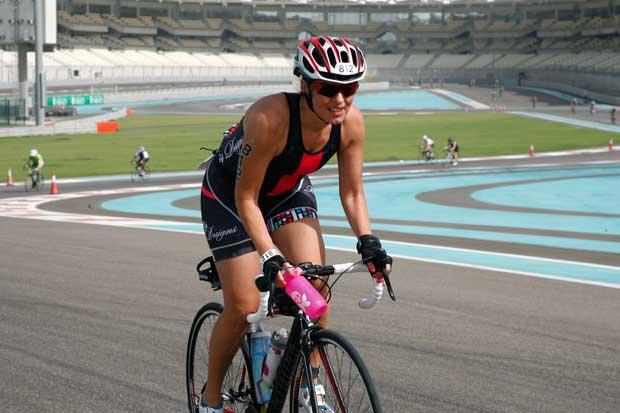
When she talks about "local" men and women it's my sense she's talking about her Arab or indigenous clientele rather than the expats who shop at her store. Wajeeha uses the acronym GCC several times in this interview. It's the Gulf Cooperation Council, a loose confederacy containing Bahrain, Kuwait, Oman, Qatar, Saudi Arabia, and the United Arab Emirates, the latter a country containing 7 Emirates, 2 of which are Abu Dhabi and Dubai. You'll note that Wajeeha differentiates between the culture of the GCC versus that of Levantine countries, while also noting that there are big cultural differences between the GCC countries. This makes it impossible to generalize about Islamic or Arabic or Middle Eastern culture. Still, I think you'll find that Wajeeha has a common sense way of simplifying it all.
Slowtwitch: You are an owner in a bike shop in Qatar. At the risk of committing my first of several offenses, your shop is more North American than it is European, because you have an attention to a North American approach to bike fitting, your website is expertly done, and your flagship brands are Specialized and Cervelo. How did all this come about?
Wajeeha: My business partners and I are all cyclists. Mohamed Al Sada and Marouf Mahmoud and I established the business after seeing a gap in the local market. There were no specific bike shops that catered to the community. There were no professional maintenance centers or any place where you could purchase small items that you needed: chains, cassettes, tires, tubes, apparel even. Further, bike variety was limited, with two brands in the market catering mostly to the lower end. From this we saw the need and decided it was the right thing to do. Qatar is an emerging market for the sports of cycling and triathlon and we saw it could grow and that we could help develop the market.
As for the brands that we carry, Marouf was a great advocate of Specialized and Cervelo, my first bike was a Specialized and we wanted to bring in variety. Specialized also offered range, from toddlers to professional bikes. We signed with Parlee for custom frame building. We also carry Colnago, Passoni and Scott by order. As for our brand investment, my background is in brand and communication and in corporate identity. I wanted to make sure that anything we did would be done professionally and of high standard. So you not only have a professional experience at carbon wheels but the look and brand personality comes through professionally as well.
Slowtwitch: My Middle Eastern contacts are in Bahrain and Israel, not from Qatar. Can you talk to me about cycling in Qatar? Yes, of course you sell to expats, but you and your partners are not expats. What can you tell us about your clientele, expat versus native-born, men versus women?
Wajeeha: My business partners are Qatari, but I am Jordanian, born and raised in Saudi Arabia and now living in Qatar. It's really amazing to see the difference in the local community versus expats, and at the same time you see that we all share the same passion for cycling. Cycling in Qatar is emerging, it's a growing scene. Investments have been made by the government to promote health and sports initiatives for their 2030 vision. More and more locals are seeing the sport of cycling as a great way to improve health and fitness.
With the local market we see a lot of questions coming our way about which bikes they should purchase. They ask the basic questions and they really want to learn. The same applies to both men and women whereas the local women are keen to know about where they can ride with other women or about indoor training. Expats, having been around bikes in Europe or in the USA, tend to know exactly what they want, though some are new to the sport and will have the same questions as the locals.
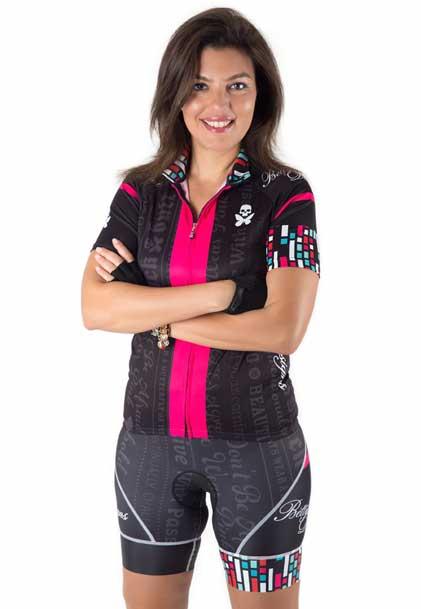
Slowtwitch: Bahrain seems to me to be the center of triathlon in the Middle East right now. What is your sense of what is going on over there? How does Bahrain do, where does it rank, among Emirates, monarchies and constitutional monarchies in the region, and how does Qatar rank, as advocates of endurance sport?
Wajeeha: I think the Kingdom of Bahrain has done a great job in promoting the sport of triathlon. With the royal family members keen triathletes it is no wonder. I think all the GCC countries have invested in sports and cycling. In the Emirates there are regular road cycling tours and they have even built a cycling track that is safe from cars. Further, the UAE has long been groundbreaking in triathlon with Abu Dhabi International Triathlon that last year was replaced with the ITU races and YAS Triathlon. Qatar has witnessed more of the Olympic distance events and sprint events but certainly the UAE and Bahrain have embraced the sport of triathlon early on.
Slowtwitch: The sale of Ironman to a Chinese conglomerate occurred largely as a bet on the disposable income of the rising Chinese middle class. The bet is that the Chinese middle class, not the upper class, will catch the Ironman fever. Is your business a bet on the rising middle class in the Middle East? Is there a rising Middle Class?
Wajeeha: Yes I do believe that there is a rising Middle Class in the Middle East. What I have witnessed in Qatar is more women entering the sport from all walks of life. I do think though that the sport requires a good income as an investment for the equipment required but with the variable distances that are now available we will see more of the middle class attempting the sport.
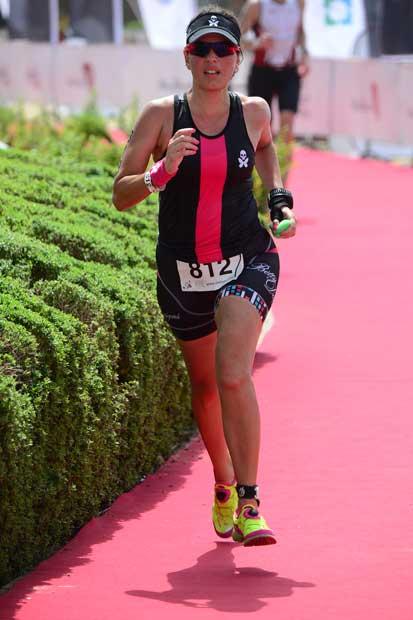
Slowtwitch: When a Middle Eastern middle class rises, does it trend toward the West, if investing in a Cervelo S5 is a Western, rather than a traditional, endeavor? Is the embrace of Western culture while holding onto the essential goodness and rightness of traditional culture difficult? Is this a fair question, or the kind of ignorant question that Westerners ask?
Wajeeha: I think it's a great question. You've asked an Easterner who was born and raised in the East but in a Western expat compound. So with an American educational background yet with the beliefs and culture of the Middle East I can tell you from my perspective. First of all, people tend to confuse religion with culture. Yes a lot of religion influences culture but the culture in Qatar is very different than [that of] a Palestinian like me!
People are generally the same as they become more savvy after embracing a sport or a hobby. We are all the same, so we will research a brand before we buy. I get asked a lot of questions why Cervelo's versus Specialized's carbon frame – which is better. Why a Parlee? The only decision that is influenced by culture or religion is whether it will be okay to be seen wearing bare shoulders – will my family approve – or how tight my knickers are. Perhaps I need to wear a loose pair of workout pants over my knickers so as not to embarrass my family.
Slowtwitch: My assumption is that you ride in the Middle East wearing the same sort of cycling apparel that women in Europe or North America ride in. Is that so?
Wajeeha: I do, yes. But I am also careful about who I ride with and when I wear my tri kit versus my normal cycling kit. I will train in my tri kit for the swim and run, making sure that if I am going to be seen in a very public place outside of where I live – which is mostly an expat compound – then I will cover up more; I will not be bare-shouldered and I will wear longer running pants, such as knickers or just above the knee. I respect the culture I live in which is very conservative. Both men and women are asked to not reveal shoulders in public locations. Unless I am training with a group that are all wearing the same clothing – tri-kits with bare shoulders – then I will ensure that I am wearing a cycling jersey, or throw on a running top.
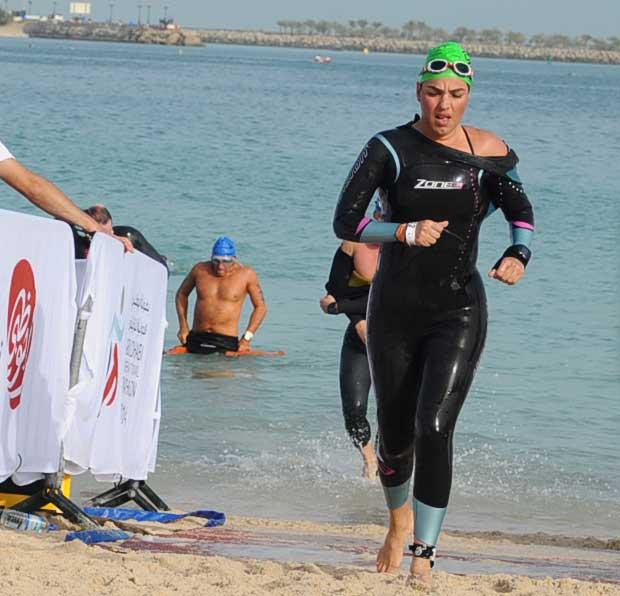
Slowtwitch: We have discussed women training and racing in Bahrain and the Emirates a lot on our reader forum. One woman wrote, "I would never walk anywhere alone and I would never do a race there… I am sure the race organizers would make sure I was safe, but running around what is considered naked in a country where the norm is showing nothing but my eyes? Although they wouldn't touch me during the race, it is like bullying, you don't have to touch me to show me your utter disrespect." I have no idea whether this a fair observation. Is this your experience, or is it occasionally your experience? Do you have to fight the expectations and disapproval of men when you train?
Wajeeha: As an Arab woman my views on this are going to be skewed, different than any European or Westerner, bearing in mind I did grow up in an American society. Having said that, the Middle East, and in particular, the GCC, are very safe for athletes, both men and women, to train, to race. Furthermore, the respect for women is of utmost importance, both for yourself as a woman and for the environment in which you live. I am a strong advocate of separate changing tents! And that nudity will get you disqualified in a race. I find it offensive and I'm quite the liberal. I would never undress in front of men I don't know.
Back to safety, yes it is safe to train, but of course I will train in areas that are normal to train in. I would not train near a construction site for example, or put myself in an area or situation where I wouldn't be there anyway. Also, to state that the norm is nothing but the eyes is severely misconstrued. In Islam, modest dress is covering the hair, neck, to the wrists and to the ankles for the women. The men must not reveal their belly buttons and pants must fall to below the knees. Furthermore, countries like Kuwait, Bahrain, Qatar and Oman, the locals will practice or not practice wearing traditional dress. In Saudi Arabia, all women are forced to be modest but covering the face is more of a choice, not enforced, and please note the covering of the face has come from several reasons, one of which is protection from the dust. Even men cover their faces.
Anyway, back to the clothing issue, she's missing out on a lot. The Levant [Syria, Palestine, Jordan, Lebanon] is very different to the GCC, where women can be seen in mini skirts at the malls and with cleavage. Actually, I've been harassed more in Western countries than in the GCC!
Slowtwitch: I would assume you've ridden in other Gulf countries. Where have you ridden, and where do you feel most accepted and approved-of, and where do you ride where you feel that there's still a lot work to be done? For example, my wife and I spent a week riding in the Atlas Mountains of Morocco a few years ago. A half-dozen of us rode into a rural town once and were surrounded by men and women, young and old, in traditional apparel. On a whim I jumped off the bike and handed it to a man, who hiked his leg over the top tube and took off on a test drive. For the next 30 minutes all our bikes were the subject of test-drives and, I guess, we risked the bikes not coming back. But it turned out fine, and it was a cultural bridge. The highlight was an old man, wrinkled, deeply tanned, must've been in his 70s at least, in a djellaba and wearing sandals, riding my bike around with a big grin. My wife never felt she was the subject of scorn or disapproval, regardless of whether we were in a big or small town. Was that just the difference between Morocco and other Islamic countries, or do you feel the cultural gap is overblown?
Wajeeha: Definitely the cultural gap is overblown. I've never felt unaccepted anywhere I go. Expats are welcomed with open arms. People love welcoming foreigners into their country. And everyone is fascinated. I've only ridden in the UAE and Qatar, having only recently taken up the sport. The ones who do honk or wave are amused, and think we are professional athletes and want to get their pictures taken with us. I've been stopped a couple of times for a photo. They always get surprised when they realize I am an Arab woman and actually they are quite impressed! Not offended at all.
Wow, I could go on for hours with this question! I think it's all about respect and your approach. If you are not friendly, if you don't smile, if you don't respect the country you are in, or their rules or culture, how can you expect anyone to respect you back or treat you nicely? It always shocks me. I am the only woman on an all-male, all-local cycling group chat. They respect my knowledge, and respect my cycling and my passion for the sport. I know that some of them do not ride with women, due to religious and cultural views, but because I am deeply respectful of them, they interact with me as their sister and have ridden alongside me for a quick chat. I also knew when to slow down and let them ride past because they were not comfortable. I was not offended, I respected the fact that they respected me by not wanting me to feel uncomfortable training with them. It's out of respect for me. They don't want the woman to think they are looking at her rear when drafting! So respectfully, they move out of the way.
Wajeeha al-Husseini's Qatar-based shop is Carbon Wheels.


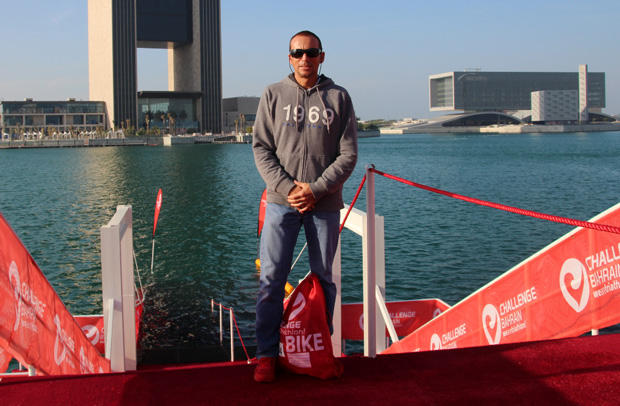
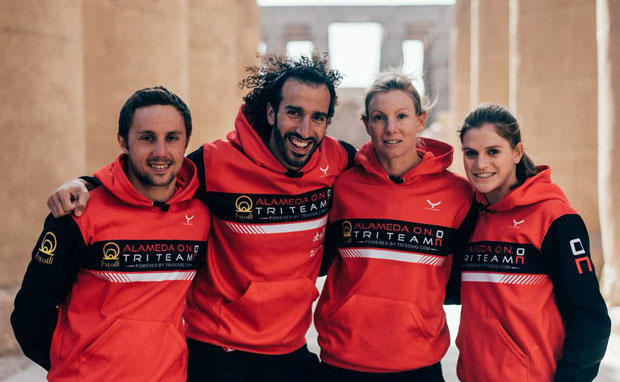
Start the discussion at slowtwitch.northend.network